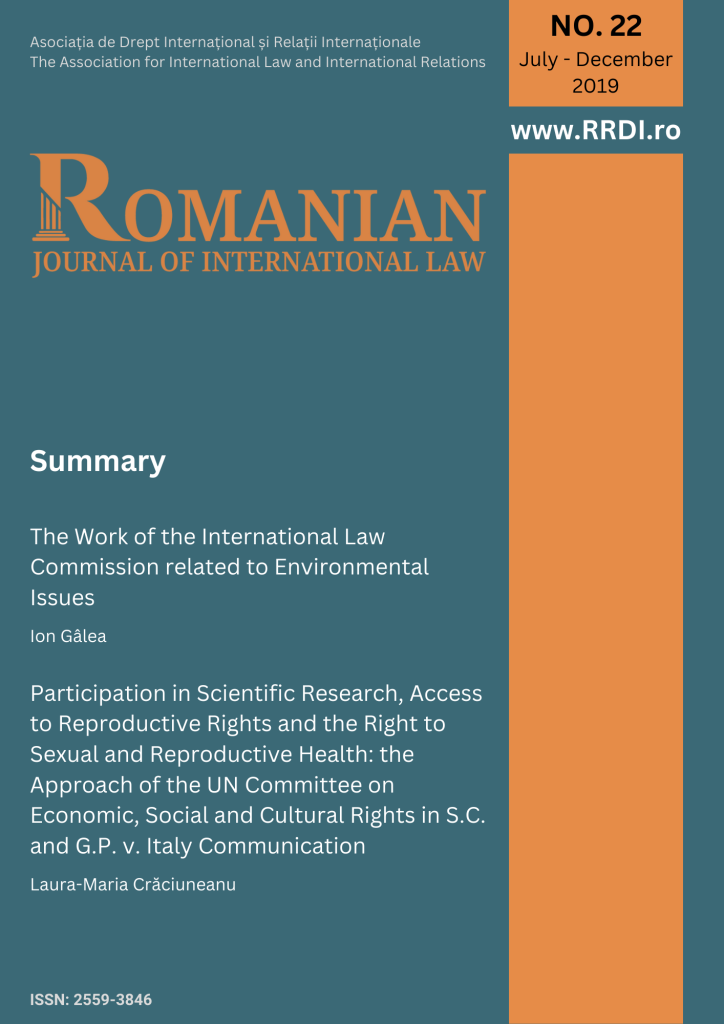Peut-on Faire du Neuf avec du Vieux ? Remarques Cursives sur la Protection Diplomatique à L’aune du « Droit International des Hommes »
Apollin KOAGNE ZOUAPET
Institution ancienne du droit international, la protection diplomatique semble revivre une seconde vie après des récents arrêts de la Cour internationale de Justice, et les Articles de la Commission de droit international des Nations Unies, adoptés en 2006. Ce regain d’intérêt pour la protection diplomatique a ranimé le débat sur la nature des droits qui sont exercés et protégés via cette action. En particulier, il est argué que, l’institution doit se moderniser pour répondre d’une part aux exigences du nouveau paradigme du droit international, qui est la protection de la personne humaine ; et d’autre part prendre en compte les évolutions du droit international en tirant les conséquences de la consécration des notions de jus cogens et obligations erga omnes. En s’appuyant essentiellement sur la pratique et le travail de codification de la Commission de droit international, ce article examine les conditions de mise en œuvre de la protection diplomatique afin de vérifier que les inévitables adaptations de l’institution ont conduit à un véritable changement. En filigrane, c’est une étude sur l’évolution de l’ordre juridique international et la nature réelle de celui-ci, au-delà des affirmations doctrinales, qui est conduite.
Participation in Scientific Research, Access to Reproductive Rights and the Right to Sexual and Reproductive Health: the Approach of the UN Committee on Economic, Social and Cultural Rights in S.C. and G.P. v. Italy Communication
Laura-Maria CRĂCIUNEAN-TATU
On the 7th of March 2019, the UN Committee on Economic, Social and Cultural Rights (CESCR) adopted its views on a communication which was submitted to it by S.C. and G.P., Italian nationals, against Italy. The authors complained that several actions of the Italian authorities – Italy being one of the States Parties to the Optional Protocol to the International Covenant on Economic, Social and Cultural Rights (OP-ICESCR) – interfered with and constituted a breach of theirs rights under article 10 (the right to the widest possible protection of the family), article 12 (right to the enjoyment of the highest attainable standard of physical and mental health – often referred to as the right to health) and article 15 (the right to benefit from scientific progress and its applications) of the International Covenant on Economic, Social and Cultural Rights (ICESCR). Being one of the few communications in which, so far, the CESCR adopted views and being also the first one to have a submission under article 15 of the Covenant, the aims of this paper are those of presenting the facts of case, the claims, the submissions and the arguments of the authors, as well as the views of the Committee – which limited its findings to a violation of article 12, alone and in conjunction with article 3 – and to discuss the approach and the concrete solution which was adopted by the Committee in this communication. Thus, the paper will first summarize the facts of the communication (Section II); it will continue with the claims and submission of the authors (Section III); it will then touch upon and briefly analyse the qualification of the communication by the Committee, the admissibility criteria and the views adopted (Section IV) finally, it will conclude by evaluating the communication in the context in which the CESCR is just building up its own jurisprudence under the ICESCR and OP-ICESCR and in light of a work-in-progress new General Comment on the relation between economic, social and cultural rights and science (Section V).
The Work of the International Law Commission related to Environmental Issues
Ion GÂLEA
This brief study exposes in an evolutionary manner the work of the International Law Commission related to environment. It approaches the topic in a chronological manner and from a horizontal point of view, having in mind that not all topics concern directly the environment. Thus, the works related to law of the sea, international waterways, transboundary aquifers, state responsibility are covered, even if there is only an indirect link between environmental protection and these topics. Moreover, the paper analyzes the recent works related to protection of the atmosphere and protection of environment in case of armed conflict.
Restitution in Kind in Investment Disputes: The Spectrum of the Libyan Nationalization Cases
Victor STOICA
The issue of primary remedies available in international law is still very much open, as international case-law has yet to reach consensus on this matter. A particular manifestation of this relates to the availability of restitution in kind or specific performance as a remedy of international law in investment disputes. The aim of this article is to analyse restitution in kind as a remedy in investment disputes, particularly looking at the classic Libyan Nationalization Cases.
The Human Right to Glaciers: Expanding the InternationalHuman Right to Water
Roxana POPA
The aim of this article is to provide a brief but conclusive analysis of the current international legal framework that protects the fundamental right to water. While glaciers constitute one form of water and are partly covered by international conventions, this approach is insufficient given the urgency of the climate crisis and its global impact. While the international right to water has been thoroughly discussed and analysed, academic focus is yet to touch upon glaciers’ place in the international legal framework. Due to structural and material differences between liquid water and glaciers, the right to glaciers should be specifically protected under international law, particularly given its interdependence with the widely-recognised fundamental right to water.

